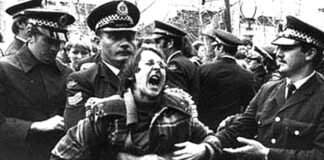Turnbull’s budget has once again exposed him as ruling for corporations and the rich.
The Coalition desperately hoped their cash handouts for voters, in the form of income tax cuts, would set them up for the coming election.
But the budget has failed to significantly change the polls. Newspoll was unchanged, showing the government still trailing 49 to 51 per cent, while the Ipsos poll had Turnbull trailing 46 to 54 per cent and Essential by 48 to 52. The more people learn about the tax cuts, the worse this will get.
Turnbull’s tax plan is loaded in favour of the super-rich. And it sits alongside massive handouts to big business and the big banks through corporate tax cuts worth $80 billion.
The government has set up its election pitch around economic management and cutting tax. It is banking on an improving economy to help it. But most workers aren’t seeing the benefits.
Wage growth is still stagnant or declining. The $10 a week tax cuts for low and middle income earners go nowhere near compensating for this.
The budget forecasts predict that wages will mysteriously bounce back to 3.25 per cent growth within two years. But they rose just 2.1 per cent over the year to March. Reserve Bank chief Philip Lowe has warned that any increase in wages will be “only gradual” over the next few years.
Any change in the next year is likely to be too small to notice, with real wages still well below the levels of six years ago.
The government is doing nothing to help get workers a pay rise. It has imposed a 2 per cent wage cap on its own workers in the public sector.
It backed the cuts to penalty rates for low paid hospitality and retail workers, and is waging war on the unions to make it harder to fight for wage rises. It has increased the fines on unions for taking unlawful industrial action and re-established the Australian Building and Construction Commission (ABCC) to go after the construction unions.
The ACTU is rightly saying that the rules around industrial relations are stacked in favour of the employers. Unions launched the Change the Rules campaign in early May with two weeks of protests around the country.
The highlight was the 120,000 workers who took over the streets of Melbourne on 9 May. Construction sites and the port of Melbourne were shut down as workers defied the law to take illegal industrial action.
Other states should follow their lead—and call combined delegates meetings and stopwork rallies.
Electing Labor
The ACTU sees Change the Rules as simply an electoral campaign aimed at kicking out Turnbull and getting Labor into government. Labor is talking of modest changes on industrial relations around the termination of enterprise agreements, use of labour hire and will scrap the ABCC (see p6).
But Labor’s policy will be well short of what the unions are demanding—particularly over anti-union laws and the right to strike.
Labor Shadow Treasurer Chris Bowen has already signalled that the ACTU’s list of changes won’t get an “automatic tick”, distancing himself from the unions by saying Labor would make its own decision on industrial relations and describing the unions and Labor as, “different people with different jobs to do.”
Responding to the budget, Labor leader Bill Shorten promised to double the tax cuts for low and middle income earners, saying they were, “more important than multinationals, big banks and big business.”
But he also tried to reassure big business that a Labor government would look after Australian capitalism, promising Labor would, “pay down national debt, faster” than the Coalition.
Labor faces a difficult series of by-elections after a High Court ruling left five Labor MPs ineligible for parliament due to dual citizenship problems. One Nation’s preferences could see Labor lose the Queensland marginal seat of Longman. But support for Turnbull’s tax cuts for the rich will also be on trial.
Malcolm Turnbull has to go. But we can’t rely on Labor to change all the anti-union rules or give us the right to strike—the only guarantee that workers can win decent pay rises, fight casualisation and improve conditions.
That’s why the Change the Rules campaign needs to be based on mobilising for industrial action. This both helps to mobilise community opinion to get rid of the Coalition, and shows Labor that the unions will keep fighting to get the changes we need.
And crucially it also builds unions’ ability to take workplace industrial action and break the law.
Victorian Trades Hall has raised the possibility of another mass rally in September. Rank-and-file unionists should push for delegates meetings, in Melbourne and in other cities, to begin mobilising for an ongoing campaign of stopwork action.





